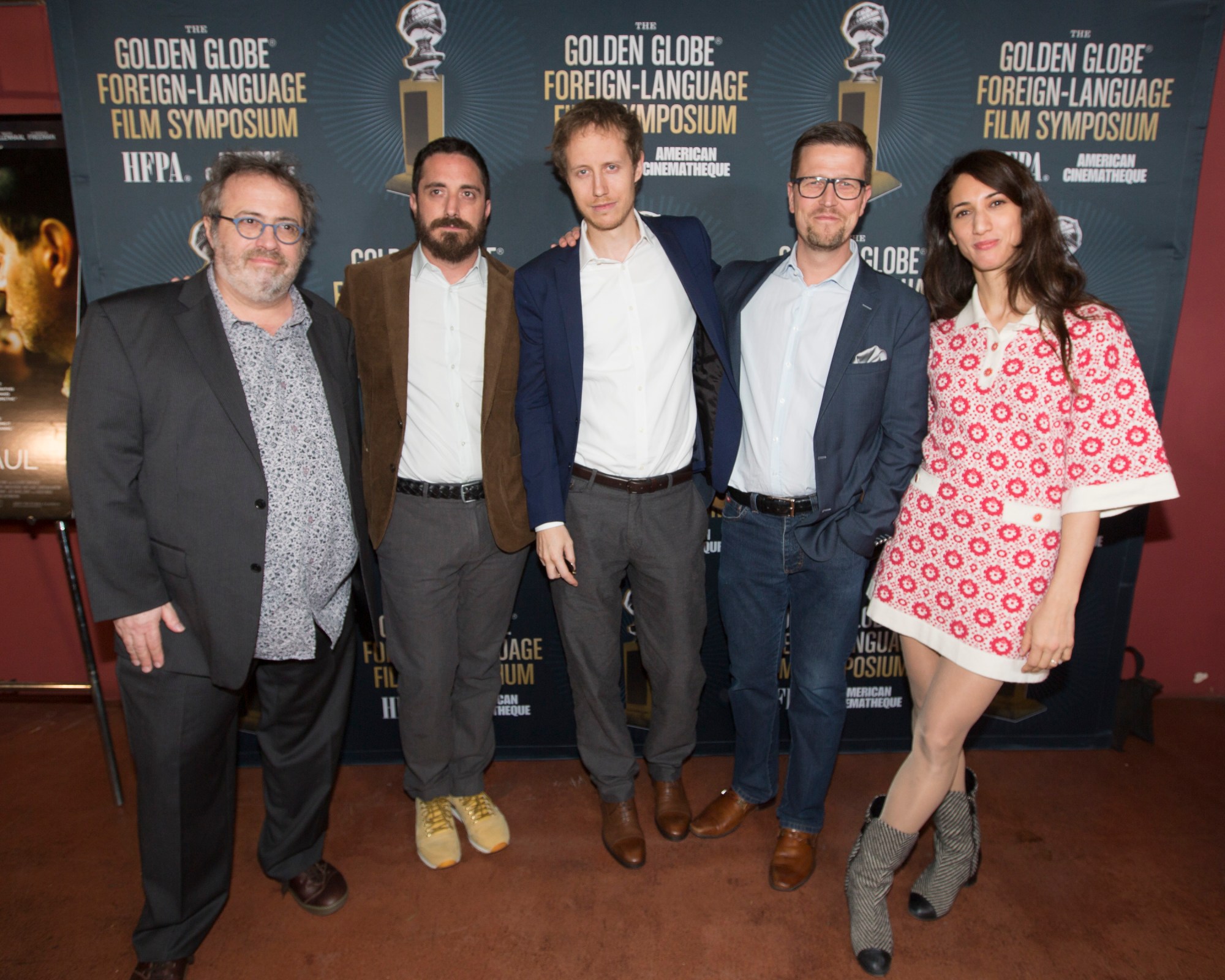
- Film
Foreign Nominees Talk Film at HFPA Symposium
The directors of the five nominated Foreign Language Films talked about everything from working with actors to editing subtitles today at the Annual Foreign Film Symposium, which took place at the American Cinematheque’s Historic Egyptian Theater.
THE FOREIGN FILM GOLDEN GLOBES NOMINATIONS
The nominees for the 73rd Best Foreign Language Golden Globes are:
Mustang (France), Son of Saul (Hungary), The Fencer Finland/Germany/Estonia, The Brand New Testament (Belgium/France/Luxembourg) and The Club (Chile). Five films representing nine countries, and that’s doesn't even take into account that Mustang, although a French production is a Turkish language film set in that country’s Black Sea region. A fact, which simply confirms the trend that festivals (and HFPA voters) are confronted with more and more: international cinema is becoming a truly global enterprise in which diverse production arrangements and languages are ever more represented often within the same film. Not only does this reflect the reality of our globalized world, but also it produces some truly wonderful films.
Mustang, directed by French-Turkish director Deniz Gamze Ergüven is both a lyrical and heartbreaking tale of resilient girlhood in the face of an adult a world that seems bent on breaking its innocence and free spirit. The HFPA’s Ali Sar writes: The film opens in a small village in a remote part of the country as a group of five free-spirited teenaged sisters splash about on the beach with their male classmates after school is out. Although their games are innocent fun, a neighbor reports to the orphaned girls’ grandmother what she considers to be their illicit behavior. Their games cause a scandal within the family with life-changing consequences for the girls. The family home turns into a prison, classes on housework and cooking replace school and marriages begin to be arranged.
Of The Brand New Testament, the latest effort by Belgian auteur Jaco Van Dormael (Toto le Héros), HFPA writer Greet Ramaekers calls the surrealist comedy, which imagines the universe’s creator as living in a suburban apartment in Brussels, “a philosophical-religious satire”. In the film God’s lesser known offspring, a tween girl named Ea, hacks her dad’s computer and emails every human the precise date of their death. “We wanted to mix comedy and poetry, and cruel comedy as well, but this is not the cinema of religion,” Van Dormael told Ramaekers. “Religion is a storyline in the background, this story is about family, about the place of women in society. And it’s about the question: If you knew the exact moment of your death, what would you do with the rest of your life?”. On learning of his nomination Van Dormael stated: “Making films is like dropping a message in a bottle in the sea. It is always a miracle when it finds a response. Thank you, Golden Globes!”
Chilean director Pablo Larrain’s The Club on the other hand is very far from the comedic tone. As HFPA journalist Yanny Nun Katz writes, the Silver Lion winner at the 2015 Berlin International Film Festival is set in a small seaside town where a group of former priests, have been sent to a secluded house to purge the sins of their pasts. This is one of those locations used by the Catholic Church to exile pedophile clergy who, in Chile like elsewhere, were spared criminal prosecution. Separated from their communities, the priests are supervised by a former Nun and meant to meditate on their transgressions. The fragile stability of their routine, is soon disrupted by the arrival of a newly disgraced companion who brings with him the terrible secrets they thought deeply buried.
Son of Saul by László Nemes is even darker. As the HFPA’s Scott Orlin writes, the film is inside Auschwitz, one of the most brutal and inhumane concentration camps, the story follows Saul (Geza Rohrig), a Jewish prisoner who is forced to work the gas chambers as a member of a Sonderkommando – the prisoner squads that were charged with both leading prisoners in the gas chambers and then disposing of them after their murder – all in all a job born out of desperation to merely survive. Saul becomes consumed with a purpose. When a child dies, he sets out to ensure that a proper Jewish burial is performed; an act that seems impossible to perform in the midst of all the madness, but an act which nevertheless symbolically makes right of all the wrong that he has been forced to do. The film won the Grand Prix this past May at the Cannes Film Festival.
Klaus Härö, Finnish director of The Fencer, told HFPA writer Erkki Kanto: “(It) takes the viewers to the time of the cold war, the time of Mr. Stalin, in Soviet Estonia. Those Estonian fathers, who did not die in the war, have now been captured by Stalin’s men. Their children basically have to go to school and play on their own … mothers must work at least two jobs, and the children stay with the grandparents or just together. Into a scene and setting like that, the children of a school in a small village receive a new teacher. It is quite clear that it was not the man’s wish to come and teach the young children physical education, but there he is. Soon, we learn that the new teacher really is a professional fencer … and things change … The Fencer is based on actual facts; it is a warm tale about the children and their teacher at very difficult times in Estonia.” Reached by the news of his nomination as he returned to Finland Härö said: “I can hardly believe the news that we are actually nominated! Needless to say, I will be happy to improve on my Jet Lag and return to Beverly Hills in January!”
All directors were on hand for the Foreign Film Symposium that the HFPA will host at the American Cinematheque on Saturday, January 9.
Luca Celada